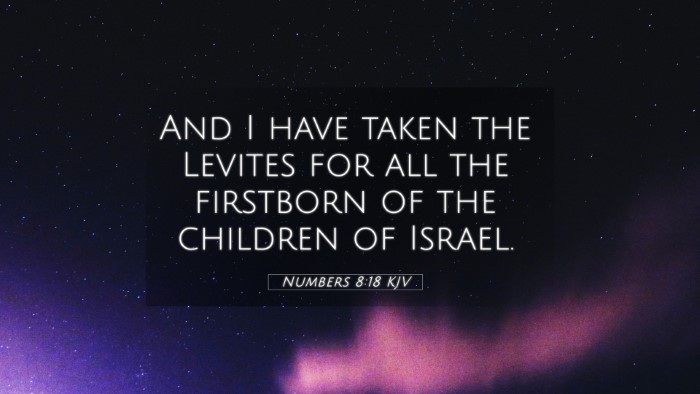Understanding Numbers 8:18
Numbers 8:18 states: "And I have taken the Levites for all the firstborn of the children of Israel." This verse reflects a significant theological and practical element of the Levitical priesthood and its role in Israel's worship and service to God.
Meaning and Interpretations
The key themes in this verse include the substitution of the Levites for the firstborn of Israel, which showcases God's provision and the sanctity of the priestly role.
- God's Choice of The Levites: The Levites were set apart for God's service, demonstrating His divine selection of a specific group for sacred duties.
- Substitution of the Firstborn: This substitution indicates the seriousness of a covenant relationship between God and His people, as the firstborn represented the heritage and future of Israel.
- The Concept of Holiness: Spiritual purity and dedication to God are emphasized, as the Levites take on roles that require consecration.
- Covenantal Context: Understanding this verse within the context of God's covenant with Israel showcases His continued commitment to His chosen people.
- Priestly Responsibilities: The Levites had distinct roles—serving in the temple and maintaining its rituals—demonstrating the importance of mediating the relationship between God and the Israelites.
Cross-References to Consider
This verse connects with several others in the Bible, establishing a deeper understanding of the Levitical role and its implications across scripture:
- Exodus 13:2 - "Consecrate to me all the firstborn, whatever opens the womb among the children of Israel, both of man and beast; it is mine."
- Exodus 29:1 - "And this is what you shall do to them to hallow them for ministering to Me as priests."
- Leviticus 8:30 - "And Moses took some of the anointing oil and some of the blood which was on the altar, and sprinkled them on Aaron and his garments, and on his sons and their garments with him; and he consecrated Aaron and his garments, and his sons and their garments with him."
- Hebrews 7:5 - "And indeed those who are of the sons of Levi, who receive the priesthood, have a commandment to receive tithes from the people according to the law."
- 1 Peter 2:9 - "But you are a chosen generation, a royal priesthood, a holy nation, His own special people."
- Numbers 3:12 - "Now behold, I myself have taken the Levites from among the children of Israel instead of every firstborn who opens the womb among the children of Israel; therefore the Levites shall be Mine."
- Acts 6:5 - "And the saying pleased the whole multitude. And they chose Stephen, a man full of faith and the Holy Spirit, and Philip, Procorus, Nicanor, Timon, Parmenas, and Nicholas, a proselyte from Antioch."
Thematic Connections
Narrative themes and theological undercurrents can be observed by linking this verse to others that underscore the importance of divine selection and service:
- Service and Sacrifice: This highlights the notion of serving God’s purpose through a consecrated life, as modeled by the Levites.
- Divine Election: The idea that God chooses certain individuals or groups for specific purposes is a recurring theme throughout the Scriptures.
- Spiritual Leadership: The Levites serve as an example of what it means to lead a life in dedicated service to God.
- Continuity of God’s Plan: The transition from the priestly duties of the Levitical line to Christ as the ultimate High Priest illustrates God’s unfolding plan through history.
Practical Applications
Understanding Numbers 8:18 helps in various aspects of Christian living, particularly:
- Recognizing the importance of being set apart for God’s work in modern contexts.
- Valuing the role of spiritual leadership and responsibility in one's community.
- Emphasizing the importance of consecration and holiness in the life of a believer.
Conclusion
Numbers 8:18 not only serves as a historical note about the Levites but also encompasses broader theological insights and applications for today's believers. Through effective cross-referencing of scriptural texts, one can gain a holistic understanding of God’s purpose and ongoing dialogue throughout the Bible.
By studying the connections between verses like Numbers 8:18 and related passages, one can engage in a deeper comparative Bible verse analysis, linking themes and showing how different scriptures echo similar messages of divine purpose and service.


